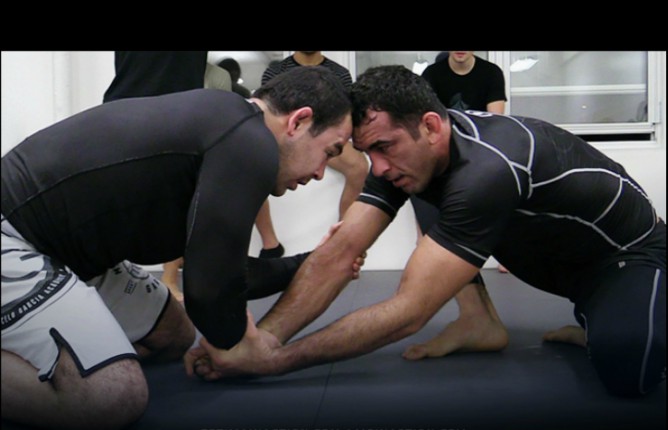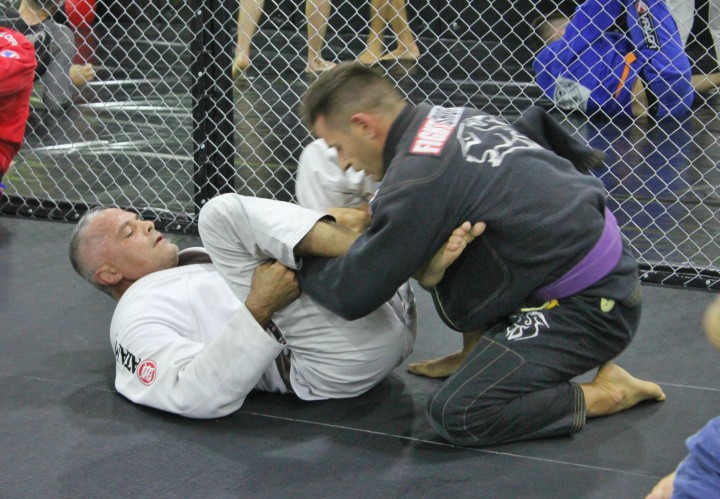So you’ve been looking for the secret to becoming a good Jiu Jitsu player? You’ve been wanting that one element required to become a champion? It’s really simple. Mat time. The one element that will improve every aspect of your Jiu Jitsu. Let’s have a look at what and how can be improved by simply increasing mat time:
Physical conditioning. There are multiple proponents (Marcelo Garcia being one of them) of sparring as the only required tool for conditioning. Sparring (especially competition sparring) will greatly improve your conditioning through varying means. It will improve your aerobic and anaerobic capacity as well as the speed and efficiency with which you execute your techniques.

Figure 1. Marcelo Garcia, one of the proponents of doing only sparring for conditioning.
Timing. Your timing will improve drastically with increased mat time and exposure to sparring, but consistency will matter a lot here. Consistency will keep improving your timing bit by bit until you will be able to execute your techniques lightning fast and the slightest of opportunities. The key element here is sparring. It’s sparring that will improve your timing over time.
Technical understanding. As ever, more time spent doing Jiu Jitsu means more time spent trying to understand it. Your technical understanding will grow and you will start to have a better view of the overall picture.
Exposure to different techniques. Although this also requires a gym with plenty of partners, generally the more mat time, the more you will be exposed to different types of guards, different types of passes, different types of submissions. The more you are exposed to this, the more you will know how to counter them.
However, there are multiple things you have to consider when adjusting your mat time, as more is not always better:
Sparring to drilling ratio. How much time you spend drilling and how much you spend sparring will have a huge influence on how often you can train. If you currently train Jiu Jitsu twice a week and 90% of your time spent on the mat is sparring, raising it to 5 times a week while keeping all of them at 90% sparring will prove very difficult. Look to adjust your sparring times in such a way that it allows you to train as often as you need, without negatively affecting your recovery. Depending on your level, drilling might actually be more important for you.
Recovery and overtraining. Your recovery is one of the elements that dictates how often you can train. Ideally, you want to find that sweet spot where you can keep training and have full recovery between sessions, while avoiding overtraining (physical or mental). A good rule of thumb is to start with a lower volume of sessions and increase from there gradually, until you find the sweet spot.
Goals. Your mat time should reflect your goals. If Jiu Jitsu is just a hobby to you, generally 3-4 sessions are enough. If however you are a competitor or plan to become one, your mat time should be at least double. If this comes in conflict with the previous point, you have to find ways to improve your recovery in order to be able to handle a larger volume of training. That can include more sleep, better nutrition, supplements, soft tissue work, etc.
Advice from Legends: Robson Moura & Marcelo Garcia on How They Prepare for a Competition
Consistency. Is it better to train 10 times a week for a month then take 3 weeks of or to train 3 times a week and be consistent with it? Most will likely say that it’s better to train less but be consistent with it. Make sure you pick a volume that you can sustain for an indefinite period of time as your timing, conditioning and technical knowledge will suffer from breaks.
Upcoming competitions and prioritization. Depending on the time left to your next competition, mat time should be adjusted accordingly. Generally, as competition approaches, it’s recommended to decrease time allocated to general physical preparedness and increase time allocated for sport specific preparedness (which is mat time).
You should take all these factors into consideration when adjusting your mat time.
Ultimately, your goal is to find how much mat time you need in order to progress as fast as possible, while still enjoying Jiu Jitsu and avoiding overtraining, be it mental or physical. You need to find that sustainable amount of volume that you can maintain indefinitely or with very rare breaks.

















